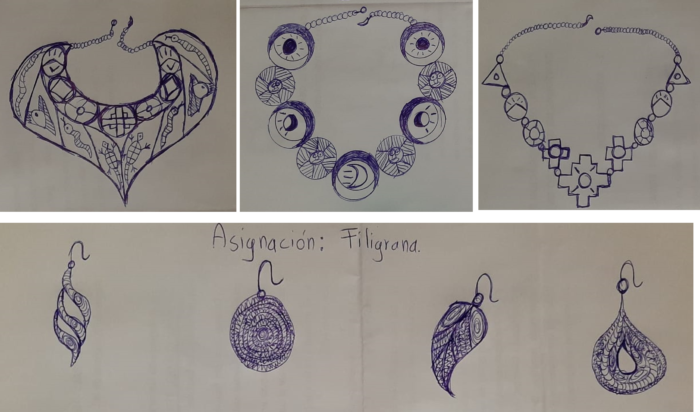
Cooperativa de Producción Artesanal Orfebres Unidos Chordeleg, otherwise referred to as Union de Joyeros Chordeleg, was established in 2017 with the goal of selling larger amounts of jewelry and improving the quality of its products. The co-op is located in the Chordeleg canton, where half of the population is dedicated to manufacturing artisan handicrafts, especially gold and silver filigree jewelry. Therefore, the jewelry industry is very competitive, and its associates need to stand out in order to find adequate sales channels. The male members of the co-op are more active in the manufacturing of jewelry, while their female counterparts are in charge of sales and finding new clients in Chordeleg, Cuenca and other cities.
The co-op’s main activities are jewelry design, manufacturing, and retail. The artisan jewelry they produce includes rings, earrings, and necklaces, as well as crowns and ornaments commissioned by clients. These jewelry pieces are made primarily from silver with stones, such as zircons. The co-op finds inspiration in the Cañari culture and elements to create their jewelry. These elements include nature, the sky, stars, connection with Mother Earth (or Pachamama), the Father Sun (or Inti), and water. These elements represent the Andean Cosmovision. Chordeleg comes from: Chor (from Quichua churu-snail) and déleg (Cañari word for prairie). They sell mostly to middlemen, as well as local jewelry shops in Chordeleg and Cuenca.
The jewelers were having a hard time finding inspiration for the design and creation of their jewelry. Many of the jewelers’ designs were downloaded and redrawn to adapt to their manufacturing process. Since they have many competitors in the city of Chordeleg, the market is oversaturated with the same designs all over local stores. With the help of NCBA CLUSA’s USAID-funded Farmer-to-Farmer program, volunteer Paula Harvey set out on a virtual assignment to assist the jewelers in generating new ideas, fashion trends and original designs that would allow them to stand out from their competitors. They hope to have original pieces to sell directly to their clients and stop selling to middlemen.

Paula has worked in jewelry and accessories design for almost 30 years for large American retailers and as an independent executive design consultant. She has broad experience in jewelry concept and design, marketing, fashion trends, brand creation, and new business development. By the end of the assignment, training participants knew how to design original jewelry that provide product differentiation to have a higher competitiveness in the market. She also helped jewelers tap into their creativity to identify adequate raw materials. Paula supported the co-op to diversify their Cañari culture inspired jewelry by advising them to include designs not only for women but also for men and adding new materials, such as wood and leather. During the assignment, Paula also worked with them to fuse international fashion trends inspired in Cañari culture to make their designs more original and stand out from the rest.
“Paula opened our eyes to other types of jewelry and to the importance of creating collections,” said Victor Jara, jeweler and President of Union de Joyeros Chordeleg. “It was interesting to know that there is demand for jewelry for men and other trends in the international market. As well as knowing how the interaction between the jeweler and the clients should be and what the international consumer demands.”
This flexible assignment was unique and different from the main Farmer-to-Farmer activities within the country. In Ecuador, the main value chains supported by Farmer-to-Farmer are coffee and cacao. This assignment was carried out because the jewelers have a high potential in the industry. Additionally, the United Nations Development Programme, or UNDP, in Ecuador asked the program directly to help them within their Creciendo con su Negocio (Growing with Your Business) program, which they implement in partnership with the Jardin Azuayo Savings and Credit Cooperative (Spanish abbreviation COACJA). This program aims to improve the competitiveness of small and medium enterprises, provide access to larger markets, establish long-term relationships with their clients and increase revenues that will be better distributed to beneficiaries throughout the value chain. UNDP-Ecuador provides support in legalization, governance, marketing, quality management, financial management, commercialization, and gender-related issues.
The co-op, like many businesses around the world, has been struggling due to the COVID-19 pandemic. Co-op members have been alternating their jewelry activities with agriculture to provide additional income to their families. Although co-op members felt demotivated at the start of the pandemic, Victor Jara said that they are now hopeful for the future thanks to the support of the Farmer-to-Farmer program and other partners. Co-op members were reenergized following Paula’s assignment, and they are looking forward to making progress in their business despite the challenges this year threw at them. In September, the Union de Joyeros Chordeleg wrapped up a second Farmer-to-Farmer assignment with volunteers Alston Taggart and Kevin Sample of Studio Red Designs, a woman-owned graphic design firm. Alston and Kevin worked with the co-op to create a logo for their brand “Cántaro” and taught members to create a digital catalog that co-op members can distribute to clients via email and their social media channels. COACJA and the local government also run an online sales platform that the co-op plans to join in order to sell their products to a larger, international market. The association members are also working on the introduction of new products, such as home goods, photo frames for special events, and glasses frames with filigree.
NCBA CLUSA’s Farmer-to-Farmer program currently offers virtual assignments in Ecuador and Peru, with future opportunities in Cambodia and Honduras. To check open volunteer positions, visit NCBA CLUSA’s volunteer recruitment page here. In-person assignments for US-based volunteers will resume once it is safe to travel internationally.


